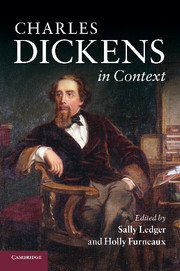Book contents
- Frontmatter
- Contents
- List of illustrations
- Notes on contributors
- Preface
- Notes on references
- PART I LIFE AND AFTERLIFE
- 1 The life of Dickens 1: before Ellen Ternan
- 2 The life of Dickens 2: after Ellen Ternan
- 3 Dickens's lives
- 4 Victorian stage adaptations and novel appropriations
- 5 Reviewing Dickens in the Victorian periodical press
- 6 The European context
- 7 Major twentieth-century critical responses
- 8 Modern stage adaptations
- 9 Modern screen adaptations
- 10 The heritage industry
- 11 Neo-Victorian Dickens
- PART II SOCIAL AND CULTURAL CONTEXTS
- Further reading
- Index
8 - Modern stage adaptations
Published online by Cambridge University Press: 05 August 2012
- Frontmatter
- Contents
- List of illustrations
- Notes on contributors
- Preface
- Notes on references
- PART I LIFE AND AFTERLIFE
- 1 The life of Dickens 1: before Ellen Ternan
- 2 The life of Dickens 2: after Ellen Ternan
- 3 Dickens's lives
- 4 Victorian stage adaptations and novel appropriations
- 5 Reviewing Dickens in the Victorian periodical press
- 6 The European context
- 7 Major twentieth-century critical responses
- 8 Modern stage adaptations
- 9 Modern screen adaptations
- 10 The heritage industry
- 11 Neo-Victorian Dickens
- PART II SOCIAL AND CULTURAL CONTEXTS
- Further reading
- Index
Summary
At the beginning of the twentieth century the theatrical tradition of staging Dickens's works was well established, as it had been, with or without his approval, in his own lifetime. There is a full account of stage adaptations as well as those in other media, to be found in H. Philip Bolton's Dickens Dramatized, which traces adaptations to the date of the book's publication in 1987. An earlier work, Dickens the Dramatist by F. Dubrez Fawcett, published in 1952, devotes a chapter to stage adaptations in the twentieth century, and a particularly rich source of accounts of amateur and professional productions is to be found in the review sections of The Dickensian, first published as the journal of the International Dickens Fellowship in 1905. From its own foundation in 1902, the Dickens Fellowship had a strong interest in dramatisations of Dickens's works, and there were many drama groups attached to its branches throughout the world. This mixture of professional and amateur interest has continued as in, for example, the annual Broadstairs Dickens Festivals, which include a dramatised work as part of the programme. Theatres mentioned in what follows are in London unless otherwise stated.
In the early years of the twentieth century some of the most significant names in theatre history performed in adaptations of Dickens, sometimes working alongside amateur groups. J. Comyns Carr's Oliver Twist had Herbert Beerbohm Tree as Fagin at Her Majesty's Theatre on 10 July 1905.
- Type
- Chapter
- Information
- Charles Dickens in Context , pp. 59 - 66Publisher: Cambridge University PressPrint publication year: 2011



